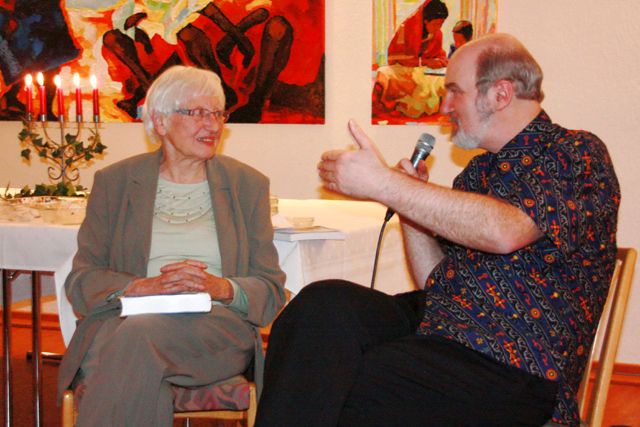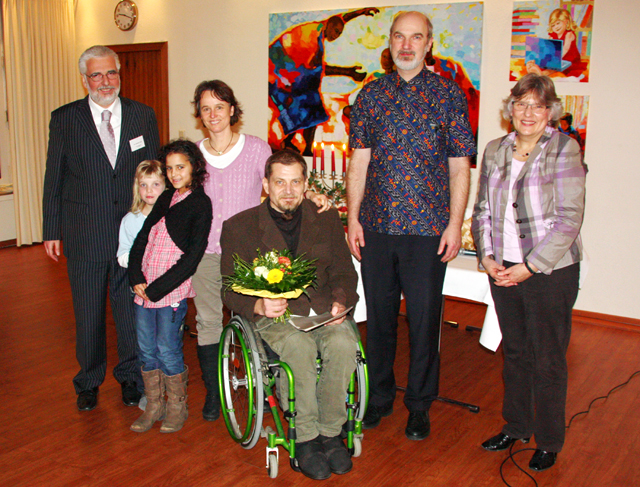From the Theological Commission of the World Evangelical Alliance
(Bonn, 26-02-2012) The German-language evangelical missiological society (Arbeitskreis für evangelikale Missiologie e. V.), which within the framework of the German, Swiss, and Austrian Evangelical Alliance brings together missiologists and researchers on global Christianity, has acknowledged the activities of Wycliffe Bible Translators and of Bible translators in general. The afem Chairman, Prof. Dr. Thomas Schirrmacher, emphasized that Bible translators around the world have delivered and still deliver enormous theological achievements which are largely ignored by members of the theological guild. Additionally, indigenous Christians are themselves increasingly more actively involved. Bringing the Bible into a
new language and culture demands not only great linguistic proficiency (and nowadays also computer proficiency). Rather, theological ability and ample sensitivity are also required. The theological discipline of history of church and dogma should not only honor this as it applies to the past but also as it applies to the present.
Upon the occasion of its annual conference in the Forum Wiedenest association and its annual awards ceremony, afem invited the retired linguist and Bible translator Prof. Dr. Ursula Wiesemann to be the guest of honor at the awards ceremony and interviewed her in connection with that occasion. In recognition of her 55 years of work with Wycliffe Bible Translators, she was awarded a Chagall Bible. The afem had already previously honored Wiesemann in 2007 with a Festschrift entitled Mission as Communication (Mission als Kommunikation) upon the occasion of her 75th birthday. Her particular focus was putting oral languages into writing. Schirrmacher emphasized that Wiesemann thus contributed to the preservation of several languages and cultures in Latin America and Africa, which according to the opinion of experts would otherwise have been absorbed into by the culture shared by a majority of the population. Most well known is the example of the Kaingang Indians in Brazil. Wiesemann produced a written language from the innumerable dialects found in villages and groups throughout all of Brazil. That written language became the standard Kaingang language through the translation of the Bible and was the way in which cohesion between the various groups even became possible in the first place. This, according to Schirrmacher, parallels the consequences of Martin Luther’s translation of the Bible for Germany.
This year’s annually awarded George W.-Peters Prize (George-W.-Peters-Preis) for special achievements in the promotion of missiology was given to the linguist and theologian Eberhard Werner (Burbach, Westerwald) for his University of Wales dissertation published by the J. Kovac-Verlag with the title “Bible Translation in Theory and Practice: A presentation of Its Interdisciplinary Nature using the Example of the Practice of Education” (“Bibelübersetzung in Theorie und Praxis: Eine Darstellung ihrer Interdisziplinarität anhand der Ausbildungspraxis”). In the course of his work, Werner found out through a global survey among Bible translators that they make exclusive use of the translation method which they became acquainted with during their training. Alongside that, he compared the most significant translation methods. Finally he advocated teaching the three most common methods of translation so that the translator could later utilize the one most applicable in his field of activity. Werner is a staff member of the German branch of Wycliffe Bible Translators (Burbach, Germany).
The Austrian theologian Martin Podobri (Linz, Austria) received the 2012 George-W.-Peters-Promotional Grant (George-W.-Peters-Förderpreis) for his final thesis at the Institute for Theology and Church Development, which is the Austrian branch of the Martin Bucer Seminary. The thesis has been published by Culture & Science Publishing. Using the thesis, which carries the title “Transformation in Austria,” a seminar going by the same name was held at the annual conference. In the seminar he developed the basis for a comprehensively understood missions approach in Austria for free churches which would seek to dispel numerous taboos.
The prize is named after Prof. Dr. George W. Peters (1907-1988). The renowned American missiologist was active during his period of retirement from 1978 to 1987 in Germany and was the founding rector of the Free College of Missions in Korntal (Freie Hochschule für Mission), now called the Academy for World Mission (Akademie für Weltmission). He was also an initiator of afem.
 Prof. Dr. Schirrmacher interviewing Prof. Dr. Ursula Wiesemann
Prof. Dr. Schirrmacher interviewing Prof. Dr. Ursula Wiesemann
 From left: The award winner Dr. Eberhard Werner with his family, along with the presenter of the award, Dr. Andreas Franz (far left) and the afem Board Members Thomas Schirrmacher and Hanna Schmalenbach (right)
From left: The award winner Dr. Eberhard Werner with his family, along with the presenter of the award, Dr. Andreas Franz (far left) and the afem Board Members Thomas Schirrmacher and Hanna Schmalenbach (right)





Stay Connected